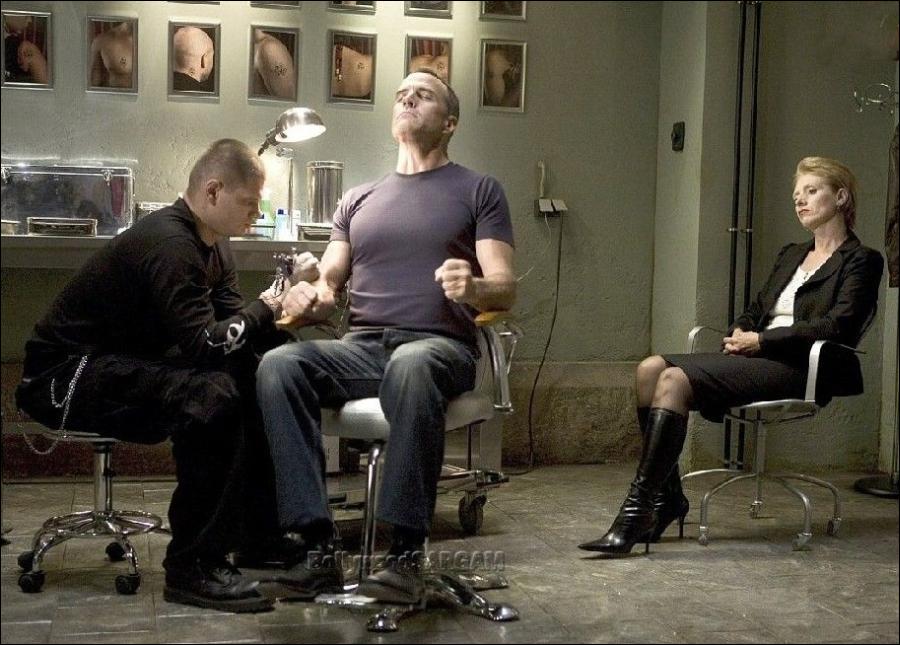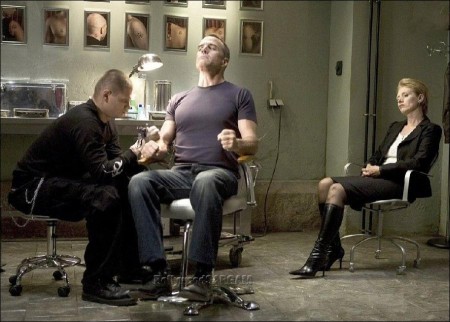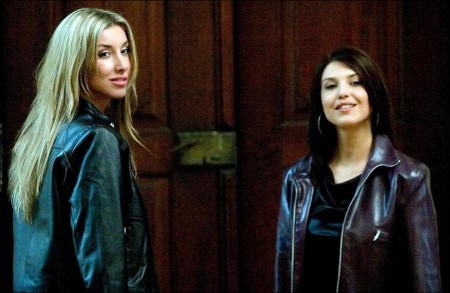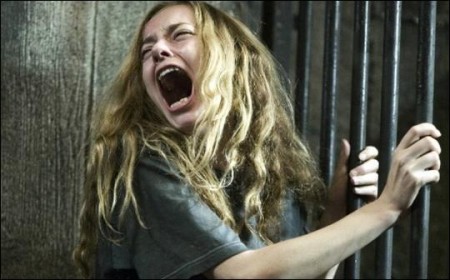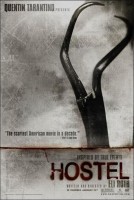Presented by genre master Quentin Tarantino and taking a much more macabre tone than did Eli Roth’s feature debut Cabin Fever, Hostel is an amalgamation of many of terrifying things about human nature and the world at large, culled from lots of pulpy-but-true stories of international organized crime, human trafficking, and sex tourism.
Relentlessly graphic and disturbing, the film is rife with explicit sex and brutal violence that may delight hard core genre fans, and prove difficult to stomach for general audiences. Three backpackers head to a Slovakian city that promises to meet their hedonistic expectations, with no idea of the hell that awaits them.
Synopsis
Internationally renowned filmmaker Quentin Tarantino presents Eli Roth’s Hostel, the follow-up to the writer-director’s hit debut, 2002’s Cabin Fever. More grisly than Roth’s feature bow, Hostel is a mixture of many of the most terrifying things about human nature and the world at large, culled from many impossible-but-true stories of human trafficking, international organized crime, and sex tourism. Relentlessly graphic and deeply disturbing, the film is sure to shock even the most hard core genre fans. Hostel tells the story of two adventurous American college buddies Paxton and Josh who backpack through Europe eager to make quintessentially hazy travel memories with new friend Oli, an Icelander they’ve met along the way.
Paxton and Josh are eventually lured by a fellow traveler to what’s described as a nirvana for American backpackers – a particular hostel in an out-of-the-way Slovakian town stocked with Eastern European women as desperate as they are gorgeous. The two friends arrive and soon easily pair off with exotic beauties Natalya and Svetlana. In fact, too easily…
Initially distracted by the good time they’re having, the two Americans quickly find themselves trapped in an increasingly sinister situation that they will discover is as wide and as deep as the darkest, sickest recess of human nature itself – if they survive.
The Making of “Hostel”
Writer / director Eli Roth is always looking for ways to scare people; yet unlike most horror auteurs, Roth knows that real life stories, and their revelations about the darker corners of human nature, are often much more frightening than monsters and boogeymen. With his debut feature, Cabin Fever, he turned newspaper headlines about a fatal flesh-eating bacteria into a horrific bloodbath among a group of young vacationers. Now, with Lions Gate Films’ Hostel, Roth once again draws inspiration from real events, this time with even more disturbing results.
Roth discovered the creative seed for Hostel during a late-night conversation with his friend Harry Knowles, the web-master of Aintitcoolnews.com. “We were talking about the sickest thing you could possibly find on the internet,” Roth recalls. “Something that went beyond the usual bestiality, skateboarding accidents or even those two Japanese girls vomiting into each other’s mouths in a bathtub.”
Knowles claimed he had stumbled across something so frightening he was hesitant to confess its discovery to Roth, which only made the director more curious. Knowles eventually forwarded Roth the link to a website; and what Roth discovered disturbed him more deeply than he could have imagined: somewhere in Thailand, a business was profiting on the visceral thrill of murder. For a fee of $10,000, anyone so willing could be escorted to a room, handed a loaded gun and offered another human being to kill.
“The concept instantly made me nauseous,” remembers Roth. “But it also felt real. People are sick. There are no limits to what they will do to another person for their own pleasure, and that’s the most horrifying thing of all. It’s what always stuck with me.”
The site claimed that in Thailand the practice was perfectly legal, as the victims were participating of their own free will. They were desolate, poverty-stricken people whose families were starving to death. By way of their self-sacrifice, they would make enough money for their loved ones to survive. “The website made it sound as if the prospective killers were benefactors, like they were doing a service for the victims by way of this bizarre life insurance scheme,” says Roth.
Roth was so jarred by this discovery that he immediately began work on a documentary on the subject; but he soon began to wonder about the dangers of uncovering the truth. “If I actually found anyone connected to an organization that profited from murder, why would they think twice about taking me out?” he reasons. Unsure of how to proceed safely, Roth set the idea aside.
In the meantime, Roth’s debut feature, Cabin Fever, was released in theaters and became Lion Gate Films’ top grossing movie of 2003, eventually grossing over $100 million worldwide. Roth began a flurry of meetings in Hollywood, eventually meeting with Mike Fleiss and Chris Briggs, the producers behind The Texas Chainsaw Massacre remake. Fleiss and Briggs wanted to make a horror film called Hostel, about young backpackers traveling through Central Europe. “I had done a fair amount of traveling and backpacking during college, as had Chris and Mike, and we loved the possibilities for a horror movie set in an environment we hadn’t seen since An American Werewolf in London,” says Roth. “But none of us really knew what the film was about beyond the title and the setting.”
The idea for Hostel sat in limbo for about two years, until one afternoon when Roth had an epiphany: why couldn’t Hostel be a film about the murder-for-profit business in Thailand? Roth imagined resetting the story in Slovakia, a location that was close enough to the usual Eurotrip routes of Paris, Amsterdam, and Spain, but also on the fringe of most travel itineraries. He envisioned two innocent American backpackers falling into a nefarious world of organized torture and murder. And suddenly, he knew he had a story to tell.
At the time of this breakthrough, Roth was in the midst of deciding between several projects to direct as his follow-up to Cabin Fever. Unsure of which project to pursue, he approached his friend Quentin Tarantino for career advice and ended up pitching his new take on Hostel. Tarantino reportedly “went crazy.” Says Roth, “Quentin’s an animated guy, and I’d never seen him this excited about anything. He was like, ‘Oh my fucking God! You have to write this! That’s the scariest fucking idea I’ve heard for a horror movie in years! Forget everything else you have in development at studios – go write this movie NOW.’”
Inspired by Tarantino’s enthusiasm, Roth unplugged his phone, shut down his e-mail, locked himself in his office and begun furiously scribbling away. “I’d call Quentin every few days if I was stuck on a story point, and he’d help reassure me that I was on the right path, or help me out of a story jam,” recalls Roth. “It was pretty incredible to have someone like him as a sounding board. I found myself writing nearly 20 pages a day. I couldn’t stop.”
Three weeks after his conversation with Tarantino, Roth showed a completed draft to Boaz Yakin and Scott Spiegel, Roth’s partners in their horror production company, Raw Nerve. “Boaz and Scott were incredibly enthusiastic about the project, and they contributed great ideas to the story,” Roth says. “After months of looking for our next project together, we knew we had finally found it.”
Roth then showed a revised script to Tarantino. Tarantino was such a fan of Roth’s draft he decided to make Hostel his next “Quentin Tarantino Presents” project and immediately joined the production as an Executive Producer. Says Tarantino, “Eli’s really found a way to push the envelope. No one’s ever seen anything like this.”
Producers Mike Fleiss and Chris Briggs subsequently contributed their own ideas to Roth’s script, resulting in a production-ready draft that was even more frightening than before. Galvanized by the script’s dynamic development, the producers raced right into production. A month later, production offices were set up in Prague.
For the lead roles of college buddies Paxton and Josh, Roth cast American actors Jay Hernandez, known for his work in Friday Night Lights, Ladder 49 and Torque, and Derek Richardson (Dumb and Dumberer). Having written a script that allowed for foreign actors to speak imperfect English, Roth was able to cast the remaining roles within the Czech Republic (with the exception of Eythor Gudjonsson, an Icelandic actor Roth met while promoting Cabin Fever). Among the noted Czech cast is Jan Vlasák, one of the top Shakespearean actors in the country, and Barbara Nedeljáková, who won the starring role of Natalya, the stunning femme fatale.
The Czech actors were thrilled to play parts that were more than the usual walk-on bits offered by American productions. “Most American movies that shoot in Prague cast out of the U.S. or England, and the Czech actors only get small parts and they are usually re-dubbed,” says Barbara Nedljáková. “But with Hostel, we weren’t trying to double for America. We could play Europeans and be ourselves. We all felt very lucky.”
Wanting Hostel to look and feel authentically European, Roth hired Milan Chadima, a Czech D.P. who had recently shot 2nd unit for Terry Gilliam on The Brothers Grimm. Says Tarantino, “I urged Roth to hire a European D.P. because they see things differently than Americans. They have a naturally more poetic sensibility.”
Roth and Chadima collaborated with production designer Franco Carbone, who had worked with Roth on Cabin Fever, to create a fun, bright atmosphere that slowly evolves into a bleak and nightmarish universe where the only color is blood. The team carefully chose a color and texture palate for every scene, deriving their aesthetic from the macabre photographs of Joel Peter Witkin and the dark short films of the London-based Brothers Quay (Street of Crocodiles).
In order to enhance the story’s visual authenticity, the production shot entirely on location. During the course of the forty-day shoot, the production moved locations 30 times, from the exotic 16th century village Czesky Krumlov, which doubles as the film’s Slovakian village, to the basement of a closed down mental hospital built in 1915.
Throughout the production process, Roth knew that Hostel would be a marked departure from Cabin Fever. “I didn’t want to make another horror-comedy,” reports the director. “I wanted Hostel to be a pure horror film – one that starts out fun, but gets darker and darker and never looks back or winks at the audience.”
If classic 1970s American horror was the inspiration for Cabin Fever, then Roth credits Asian and South Korean horror filmmaking as the inspiration for Hostel. Yet Roth was relatively ignorant of young Asian masters like Hideo Nakata, Park Chan-Wook, and Takashi Miike until he attended world film festivals during the promotion of Cabin Fever. “I was exposed to a whole new world of Asian cinema I never knew existed. I was stunned,” says the director. “Their horror films are so much more creative, disturbing, and effective than anything I have seen coming out of America. I started watching as many Asian and South Korean films I could get my hands on.”
Roth cites films like Miike’s Audition, Park’s Sympathy for Mr. Vengeance, and older films like Sluizer’s The Vanishing and Hardy’s The Wicker Man as important touchstones in the development of Hostel. Particularly fond of Miike, Roth even wrote a part in Hostel for the cult Japanese director, and was honored when Miike flew to Prague from Japan to play the role.
Relentlessly graphic and deeply disturbing, Hostelshould confirm Roth as an exciting director poised at the cutting edge of modern horror filmmaking. Like his Asian counterparts, he deliberately stretches genre boundaries in an effort to locate authentic, raw terror. “Directors like Miike and Park have been pushing the envelope of cinema for years,” says Roth. “And that’s always been my goal from the beginning. I think Hostel will surprise even hard core genre fans.”
These production notes provided by Lionsgate Films.
Hostel
Starring: Jay Hernandez, Jennifer Lim, Derek Richardson, Barbara Nedeljakova, Jana Kaderabkova
Directed by: Eli Roth
Screenplay by: Eli Roth
Release Date: January 13, 2006
MPAA Rating: R for brutal scenes of torture and violence, strong sexual content, language, drug use.
Studio: Lionsgate Films
Box Office Totals
Domestic: $47,326,473 (58.7%)
Foreign: $33,252,461 (41.3%)
Total: $80,578,934 (Worldwide)
